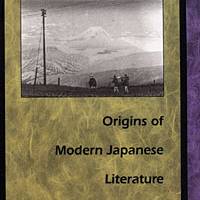"Origins of Modern Japanese Literature" is a radical reexamination of how Japanese literature developed after the 1868 Meiji Restoration. It's made up of a series of essays by Karatani Kojin that were originally published in the late '70s, a time when new critiques of modernity were gathering steam in Japan. Karatani's main argument is that modern literary themes such as "the landscape" and "childhood" are not timeless, culturally neutral concepts that the modernists happened to take an interest in, but products of modernism themselves, with specific and intelligible histories. These histories, however, are suppressed by the same "inversions" (as Karatani puts it) that bring the themes into being: "In the very moment when we become capable of perceiving landscape, it appears to us as if it had been there, outside of us from the start."
Origins of modern Japanese literature, by Kojin Karatani, Translation edited by Brett de Bary.
240 pages
Duke University Press, Nonfiction.
This is not light reading, and those expecting a straightforward history of Japanese literature will be disappointed, but Karatani's ear for anecdotes makes the book more than a dry theoretical exercise. For the English edition, Brett de Bary and her team of co-translators add background information, and an entirely new essay by Karatani, "The Extinction of Genre," is included. This additional material makes the translation worth a look even for those who can read the original.
Read archived reviews of Japanese classics at jtimes.jp/essential.



